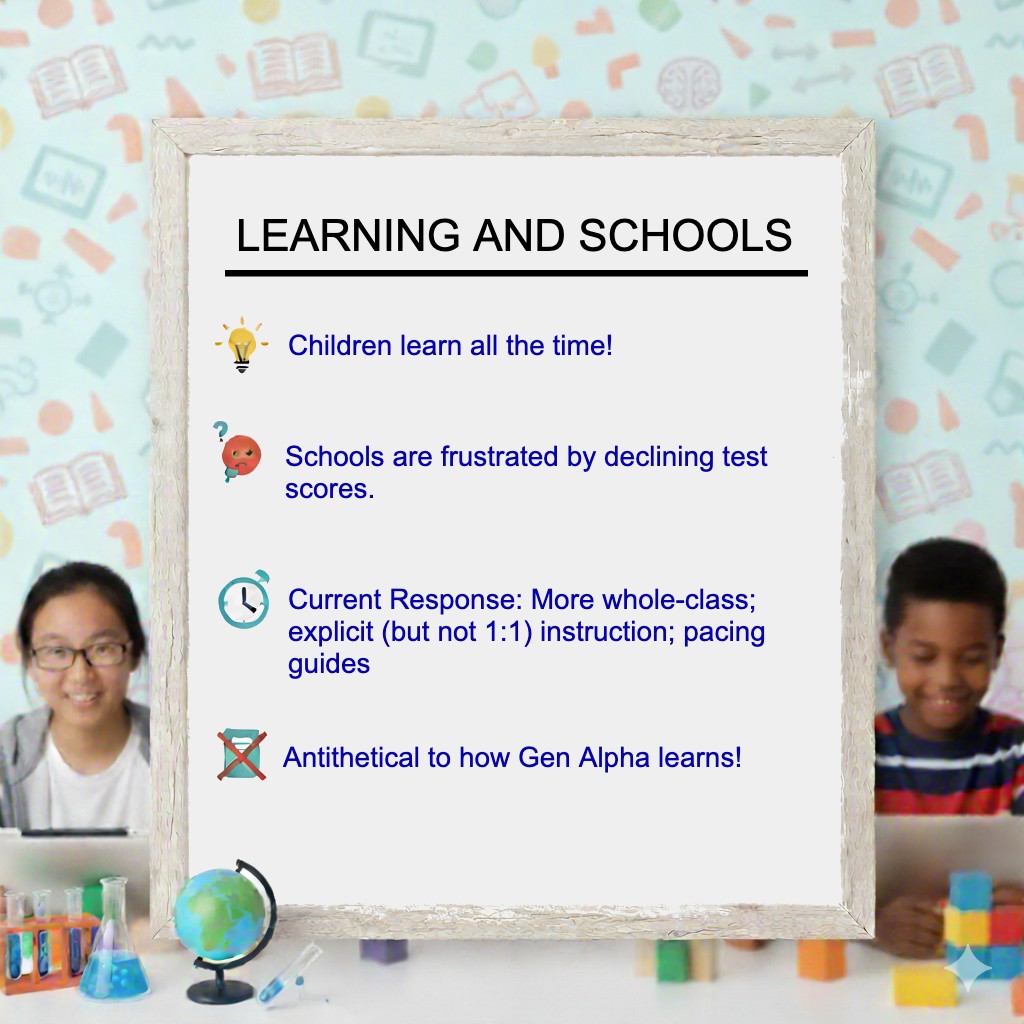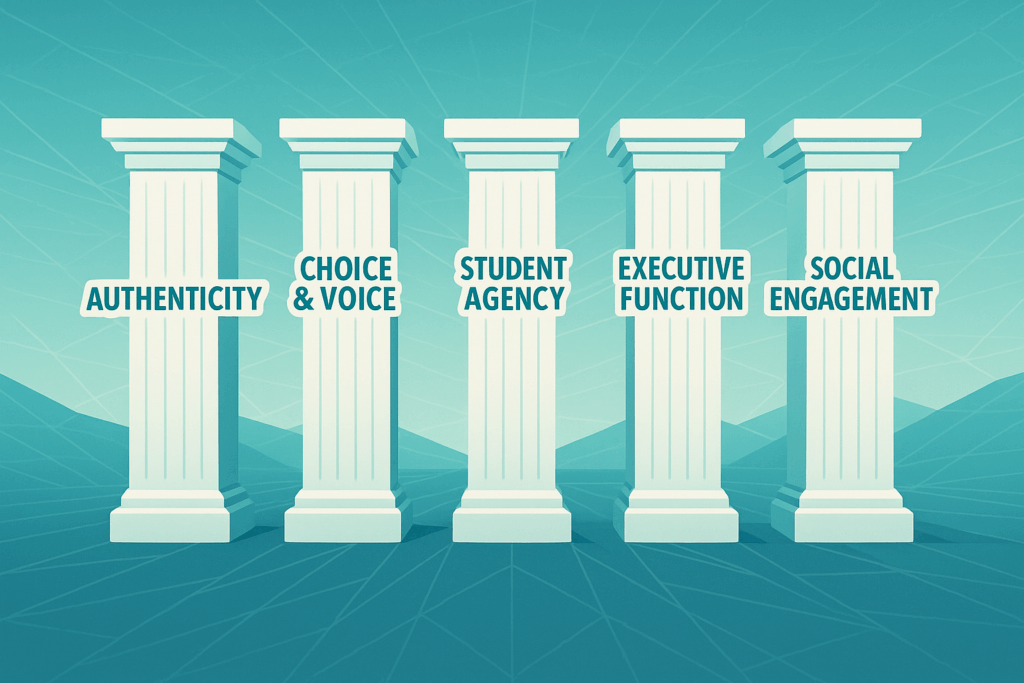Let’s think differently about how schools can serve students. . . .
Learning and Schools
Children love to learn! They learn all the time!
Schools, however, are frustrated by declining test scores that indicate students are not learning from teachers’ lessons.
Sadly, the result is a leaning into more whole-class instruction, more explicit (but not necessarily one-on-one) instruction, more pacing guides, and more time spent on language arts and math.
This could not be more antithetical to the way Gen Alpha learns.

Who Is Gen Alpha?
2010 . . . The birth year that marks the beginning of Generation Alpha (children born between 2010 and 2025); the year of the release of the first iPad, selling 300,000 in their first day on the market.
According to Common Sense Census 2025,
“By age 2, 4 in 10 children have their own tablet (40%). By age 4, more than half (58%) of children have their own tablet. By age 8, nearly 1 in 4 children have their own cellphone. Overall, 51% of children aged 8 and younger have their own mobile device (such as a tablet or cellphone). . . . In the majority of U.S. households, there is at least one mobile device, with 96% having a smartphone that connects to the internet, and 75% having a tablet. . . .”
Gen Alpha is often referred to as the iPad generation. But whether students are fortunate enough to have a tablet or are just using their family members’ smartphones, the shifts in learning are the same.
Gen Alpha students are unique from past generations in their approach to learning. They:
- – Value choice
- – Seek autonomy and independence
- – Are curious
- – Expect immediacy of information
- – Are used to multimedia content delivery
- – Multitask
- – Value authenticity
The Executive Function & SEL Dip
At the same time, their accessibility to technology and the internet has caused them to be somewhat more isolated from in-person social engagements (not to say they don’t have thriving online relationships, and videoconferencing with a remote relative or friend is powerful).
However, while the short-video, link-to-link characteristics of today’s web surfing and app use promote multitasking, the brain actually can’t multitask. When you engage in two activities at once, only one at a time receives your brain’s processing power, which means the overall experience is lower in quality than if you stayed with one activity to completion and then moved to the other — though in today’s world, that’s not happening!
Also, this is the generation most wholly affected by the COVID pandemic, in terms of both the illness, deaths, and stress, as well as the shift to at-home learning in a system that was woefully unprepared to offer anything other than live, in-class learning.
These situations can negatively affect executive function and social, emotional, and mental wellness.
Teaching Gen Alpha
All of these shifts, positive and negative, have redefined what today’s learners need from school: not just what they learn, but how they learn best.
Although we designed our Future-Powered Classrooms and, specifically, Future-Powered Kindergarten for this very generation, there are key takeaways schools can implement with or without the help of IDE Corp.

| Authenticity | Choice & Voice | Student Agency | Executive Function | Social Engagement |
| PBL (curriculum, instruction, & assessment) | Differentiated Activity Lists | Students scheduling and monitoring their own time | Built through activities, structures, and facilitation (my book) | Collaborative problem solving, including protocols & consensus-building |
The Future Won’t Wait
In the past, technological changes that shifted the way we work and live made their impact over a number of years. Now, it’s pretty much months . . . no, weeks . . . no, days. Schools can’t afford lengthy redesign cycles. If schools continue to teach content whole-class, from the front of the room, they will be replaced by AI. But if they empower students with what technology cannot (e.g., creativity, empathy, collaboration, and adaptability), they’ll prepare a generation ready to thrive in an AI-augmented world.
Build classrooms that honor the individuality of the students and utilize technology as a partner in the process; shift the role of the teacher to that of facilitator of a rich and energizing learning environment.
IDE Corp. is the creator of the Future-Powered Classroom (the next generation of the Learner-Active, Technology-Infused Classroom). We offer professional learning experiences to help schools shift to innovative ways of teaching through:
- – School-wide studies and action plans
- – Comprehensive, on-site and remote professional learning experiences
- – Leadership coaching
- – Curriculum design
- – MyQPortal school-wide resource, including hundreds of PBL units and instructional tools
- – Virtual Learning Communities — consultant-facilitated online courses on a broad range of topics, including those mentioned above
- – School-wide “Professional Learning Experience” (PLE) resources to build a culture of professional learning to drive meaningful change through PBL, fostering student agency through differentiated activity lists, supporting ELLs, building executive function, and implementing strategies for maximizing student achievement
For a free school or district consultation to help us learn more about you and offer ideas for how we can help, contact Nicole (Nik) at solutions@IDECorp.com
